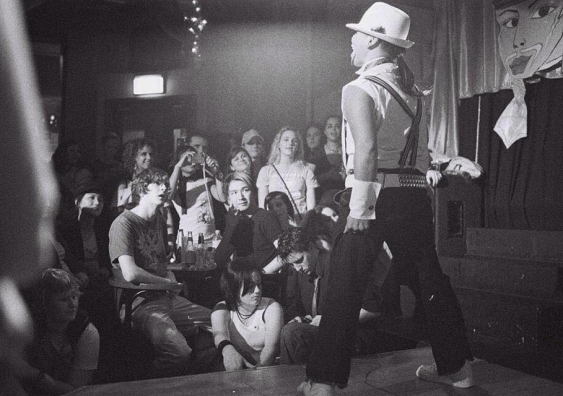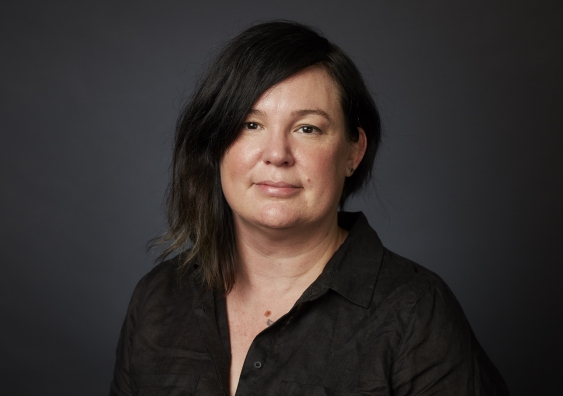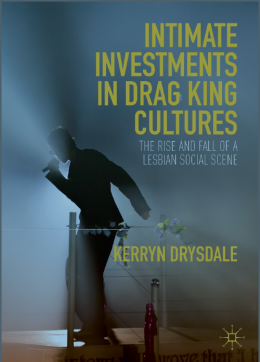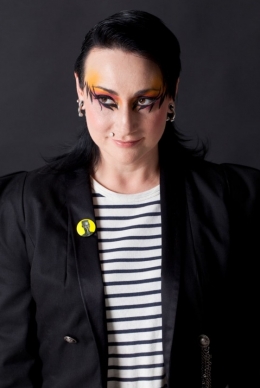The rise and fall of a lesbian social scene explored in new book about drag kings
The weekly drag king performances at a Newtown hotel are examined in Intimate Investments in Drag King Culture, to be launched this week.
The weekly drag king performances at a Newtown hotel are examined in Intimate Investments in Drag King Culture, to be launched this week.

Diane Nazaroff
UNSW Media & Content
+61 (2) 9385 2481, +61 (0)424 479 199
diane.nazaroff@unsw.edu.au
Wednesday nights – colloquially named Dyke Night in Newtown – were once synonymous with drawing crowds to see the drag king performances at Kingki Kingdom (later known as Queer Central) at The Sly Fox Hotel.
Drag kinging is a cultural practice in which individuals, conventionally women but also transgender, non-binary and other gender diverse people, consciously enact forms of masculinity within the context of a performance.
According to Research Fellow at the UNSW Centre for Social Research in Health Research, Dr Kerryn Drysdale, these performances were engaging, even titillating.

"My hope is that the book conveys some of those intimate investments in the people": author Kerryn Drysdale.
“But they also signified a range of social dynamics established by the atmosphere generated in those packed spaces, with dancing, drinking and socialising taking place long after the last performance of the evening,” she says.
Dr Drysdale explores the lesbian and queer women scene at The Sly Fox Hotel in her book Intimate Investments in Drag King Culture: The Rise and Fall of a Lesbian Social Scene.
The drag king performances were held at the hotel for a decade, from 2002 until 2012.
“People were so invested in drag king performance, and the social scene it supported, over the long decade of its running,” she says. “My hope is that the book conveys some of those intimate investments in the people, places and practices that constituted Sydney’s drag king scene.”
Dr Drysdale says the globally recognised phenomenon of drag king performances has links to a longer tradition of live performances of gendered and sexual expression.
“Some of the earliest academic literature of drag kings charted its global emergence as almost simultaneously occurring from the 1990s,” she says.

The earliest drag performances were seen in Sydney drag king as early as 1996, off the back of cultures taking place in the US, UK and Canada, but it quickly became associated with the social culture that developed around Newtown’s night-time economy with the creation of Kingki Kingdom.
Dr Drysdale says that when viewed from the perspective of the regular attendees, drag king cultures are a significant social practice.
“From those I spoke to, Sydney’s drag king scene was revealed to be a small world that provided the site in which to anchor an expansive imaginary of lesbian social life,” she says. “As much as the drag king performances gave events their raison d’etre, the scene that supported them was represented through its participants’ intimate investments in ‘being together’, or what I’ve called ‘intimate attunement’. In turn, this process of attunement simultaneously highlighted the precarity of social infrastructure, which accords with a longer legacy of lesbian commercial unsustainability in the area.”
The drag king performances at The Sly Fox Hotel declined in 2012, right in the middle of Dr Drysdale’s ethnographic exploration.
“I had to shift focus from documenting encounters taking place in the present to addressing a social phenomenon in the process of disappearing,” Dr Drysdale says.

Sveta Gilerman, who performs as DJ Sveta, is one of Australia’s most well-known queer DJs, the co-founder of the Kingki Kingdom/Queer Central drag king events, and will be a panellist at Friday's book launch.
There were several reasons for the decline of the scene, including increasing economic instability of LGBTIQ+ social ventures, and the “post-gay” era which saw a rising political ambivalence to claiming a non-heterosexual identity. But Dr Drysdale says drag is not necessarily antithesis to trans visibility, given the role trans and other gender diverse people played in Sydney’s drag king scene. Rather, she says, “the heightening, but ideally productive, tensions between historically entrenched gay and lesbian spaces and an increasing trans and gender-diverse presence who may not share those same attachments may be generative of their own investments in different iterations of drag.”
Lately, Sydney has seen a resurgence of interest in drag king performances, with pop-up events circulating across several sites. While these events potentially represent a new scene in the making, these new types of investments also reinforce the feeling that Queer Central was representative of the end of the era.
“While Sydney’s drag king scene may no longer be found in the range of sites and practices that previously comprised it, the scene endures in its telling for those who participated in it because it matters to them,” Dr Drysdale says.
Pioneers in the drag king scene will be guest speakers at the launch of Intimate Investments in Drag King Culture this Friday, 30 August.